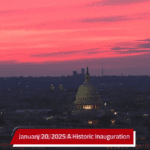On January 20, 2025, Donald J. Trump was inaugurated as the 47th President of the United States, marking a historic return to the White House. In a ceremony held inside the Capitol Rotunda due to inclement weather, President Trump delivered a fervent inaugural address, proclaiming the onset of a “golden age” for America and outlining an ambitious agenda aimed at national rejuvenation. President Trump began his speech by declaring, “The golden age of America begins right now. From this day forward, our country will flourish and be respected again all over the world.” He emphasized a commitment to restoring the nation’s prosperity and global standing, asserting that under his leadership, America would become “the envy of every nation.”
Throughout his address, President Trump criticized previous administrations, accusing them of betraying the American people. He stated, “For many years, a radical and corrupt establishment has extracted power and wealth from our citizens, while the pillars of our society lay broken and seemingly in complete disrepair.” Without naming specific individuals, he condemned the “corrupt establishment” and vowed to reverse policies he deemed detrimental to the nation’s interests. President Trump outlined several key initiatives aimed at addressing what he described as the nation’s most pressing challenges. He announced plans to declare a national emergency at the southern border, pledging to halt all illegal entry and commence the deportation of “millions and millions” of undocumented immigrants.
The President emphasized a return to energy independence through increased domestic oil production, including fracking and drilling, signaling a departure from previous environmental policies. He proposed imposing tariffs on foreign goods to protect American industries and announced intentions to revoke initiatives like the Green New Deal and electric vehicle mandates, aiming to bolster traditional manufacturing sectors. Among the more unconventional proposals, President Trump declared plans to rename the Gulf of Mexico to the “Gulf of America” and expressed a desire to reclaim the Panama Canal, underscoring a focus on national sovereignty.
Tone and Rhetoric
The President’s speech was marked by a blend of optimism for the nation’s future and stark criticism of its current state. He portrayed himself as a leader divinely chosen to guide the country through turbulent times, stating, “I was saved by God to make America great again.” Despite pledging to be a unifying figure, his address contained pointed remarks towards political adversaries and the media, reflecting a continuation of his combative rhetorical style.
The inauguration was attended by a host of dignitaries, including former Presidents Joe Biden, Barack Obama, George W. Bush, and Bill Clinton, along with their respective spouses. Notably, tech industry leaders such as Elon Musk, Mark Zuckerberg, Jeff Bezos, and Sundar Pichai were present, indicating a potential intersection of technology and policy in the new administration. The ceremony featured performances by artists like Carrie Underwood, adding a celebratory tone to the proceedings.
Public and Political Reactions
Reactions to President Trump’s inaugural address were polarized. Supporters praised his bold vision and commitment to transformative policies, viewing his return to office as a reclamation of America’s foundational values. Critics, however, expressed concern over the confrontational tone and the feasibility of his proposed initiatives, cautioning against potential overreach and divisiveness. As President Trump embarks on his second term, the nation stands at a crossroads, with his administration poised to implement a series of sweeping changes. The coming months will reveal how these policies unfold and their impact on the United States’ trajectory, both domestically and on the global stage.













